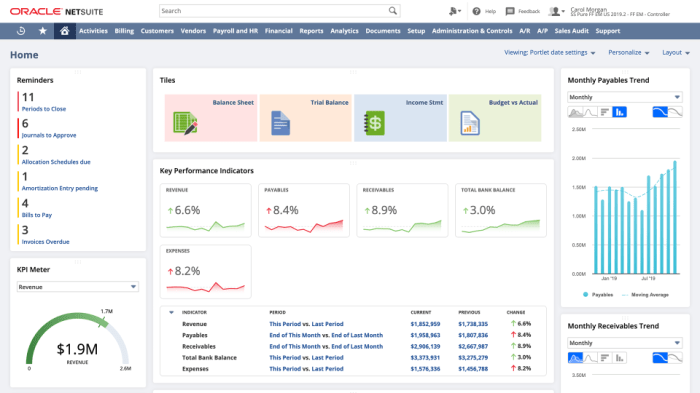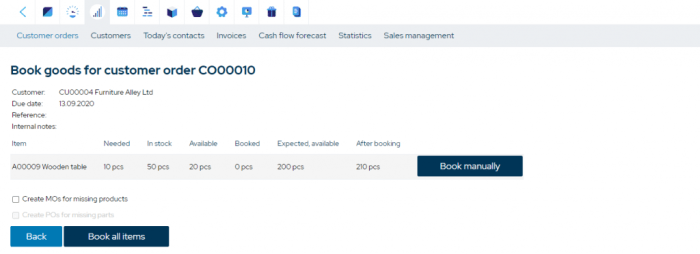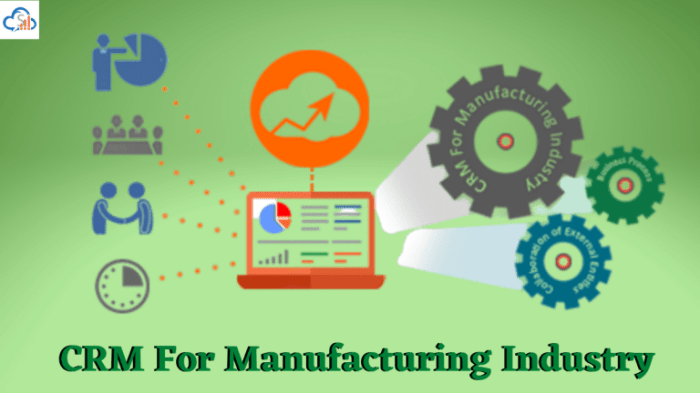CRM software for manufacturing industry is revolutionizing how businesses operate, manage relationships, and streamline processes. Effective CRM implementation offers significant advantages, improving customer satisfaction, optimizing production, and boosting overall profitability. This enhanced efficiency translates to better resource allocation, reduced operational costs, and increased market competitiveness. Understanding the nuances of choosing and implementing the right CRM system is crucial for manufacturing companies seeking to thrive in today’s dynamic market.
From managing complex supply chains to tracking intricate production processes, manufacturing businesses face unique challenges. A well-integrated CRM system can address these hurdles by providing a centralized platform to manage customer interactions, track orders, manage inventory, and collaborate effectively across different departments. This allows for better forecasting, proactive problem-solving, and data-driven decision-making, ultimately leading to improved business outcomes.
The manufacturing industry, known for its complex processes and intricate supply chains, is undergoing a digital transformation. At the heart of this transformation lies Customer Relationship Management (CRM) software. No longer a luxury, CRM is becoming a necessity for manufacturers seeking to optimize operations, enhance customer relationships, and gain a competitive edge. This comprehensive guide delves into the critical role of CRM in manufacturing, exploring its benefits, functionalities, selection process, and implementation strategies.
We will also cover key considerations and frequently asked questions to help you navigate this crucial business decision.
Understanding the Unique Needs of Manufacturing CRM
Unlike other industries, manufacturing presents unique challenges that require specialized CRM solutions. These challenges include managing complex product lifecycles, tracking intricate supply chains, handling diverse customer segments (OEMs, distributors, end-users), and ensuring regulatory compliance. A robust manufacturing CRM must address these specific needs by offering functionalities beyond basic contact management. Key features include:

Source: method.me
Key Features of Manufacturing CRM Software:
- Inventory Management: Real-time tracking of inventory levels, stock alerts, and automated ordering processes.
- Supply Chain Management: Visibility into the entire supply chain, from raw materials to finished goods, enabling proactive issue resolution.
- Order Management: Streamlined order processing, accurate tracking, and efficient fulfillment.
- Production Scheduling: Optimized scheduling of production runs based on demand forecasts and resource availability.
- Quality Control Management: Tracking and managing quality control processes, identifying and addressing defects promptly.
- Customer Service & Support: Efficient handling of customer inquiries, complaints, and technical support requests.
- Sales Force Automation (SFA): Tools to automate sales tasks, manage leads, track sales opportunities, and improve sales forecasting.
- Project Management: Managing complex projects, tracking progress, and ensuring timely completion.
- Reporting and Analytics: Comprehensive dashboards and reports providing insights into key performance indicators (KPIs) and business trends. This includes manufacturing-specific metrics like production efficiency, defect rates, and on-time delivery rates.
- Integration with ERP Systems: Seamless integration with Enterprise Resource Planning (ERP) systems for a holistic view of the business.
Benefits of Implementing CRM in Manufacturing
The advantages of implementing a well-chosen CRM system in a manufacturing environment are significant and far-reaching. These benefits contribute to improved efficiency, increased profitability, and enhanced customer satisfaction. Some key advantages include:
Key Benefits of Manufacturing CRM:
- Improved Customer Relationships: Personalized interactions and proactive communication foster stronger customer loyalty.
- Enhanced Sales Productivity: Automated sales processes and improved lead management free up sales teams to focus on closing deals.
- Optimized Production Processes: Real-time data and insights enable efficient production planning and resource allocation.
- Reduced Operational Costs: Streamlined processes and reduced manual tasks minimize operational expenses.
- Increased Revenue and Profitability: Improved sales, optimized production, and reduced costs contribute to higher profitability.
- Better Inventory Management: Minimizes stockouts and overstocking, leading to cost savings and improved customer satisfaction.
- Improved Supply Chain Visibility: Enables proactive risk management and improved responsiveness to supply chain disruptions.
- Enhanced Collaboration: Improved communication and information sharing among different departments.
- Data-Driven Decision Making: Access to real-time data and comprehensive reports enables informed decision-making.
- Improved Compliance: Easier management of regulatory requirements and industry standards.
Choosing the Right Manufacturing CRM Software
Selecting the appropriate CRM software requires careful consideration of various factors. The best solution will depend on the specific needs and size of your manufacturing business. Key factors to consider include:
Factors to Consider When Choosing a Manufacturing CRM:
- Scalability: Ensure the chosen CRM can adapt to your business growth.
- Integration Capabilities: Compatibility with existing ERP, accounting, and other business systems.
- Customization Options: Ability to tailor the system to your specific workflows and requirements.
- User-Friendliness: Intuitive interface and ease of use for all users.
- Security and Data Protection: Robust security measures to protect sensitive data.
- Cost and ROI: Consider the total cost of ownership (TCO) and the potential return on investment (ROI).
- Vendor Support: Reliable vendor support and training resources.
- Industry-Specific Features: Look for features specifically designed for the manufacturing industry, such as those mentioned earlier.
Implementing and Managing Your Manufacturing CRM
Successful CRM implementation requires a well-defined plan and dedicated resources. Key steps include:
Implementing Your Manufacturing CRM:, Crm software for manufacturing industry
- Needs Assessment: Identify your specific business needs and requirements.
- Software Selection: Choose the CRM software that best meets your needs.
- Data Migration: Transfer existing customer and product data to the new system.
- User Training: Provide comprehensive training to all users.
- System Integration: Integrate the CRM with other business systems.
- Ongoing Monitoring and Optimization: Regularly monitor the system’s performance and make adjustments as needed.
Frequently Asked Questions (FAQ)
Here are some frequently asked questions about CRM software for the manufacturing industry:
- Q: What is the cost of CRM software for manufacturing? A: The cost varies widely depending on the size of your business, the features you require, and the vendor you choose. Some offer subscription-based models, while others may require upfront licensing fees. It’s essential to obtain quotes from multiple vendors to compare pricing and features.
- Q: How long does it take to implement a manufacturing CRM? A: Implementation timelines vary depending on the complexity of the system and the size of your business. Expect the process to take several weeks or even months.
- Q: What are the key metrics to track after implementing a CRM? A: Key metrics include sales conversion rates, customer satisfaction scores, production efficiency, on-time delivery rates, and inventory turnover.
- Q: How can I ensure my manufacturing CRM is secure? A: Choose a vendor with robust security measures, including data encryption, access controls, and regular security audits. Also, ensure your employees are trained on best practices for data security.
- Q: What if my CRM doesn’t integrate with my existing systems? A: Many CRMs offer APIs (Application Programming Interfaces) that allow for integration with other systems. However, it’s crucial to verify compatibility before selecting a CRM.
Conclusion
Implementing a CRM system is a strategic investment that can significantly benefit manufacturing businesses. By carefully considering your needs, selecting the right software, and implementing it effectively, you can unlock significant improvements in efficiency, customer relationships, and overall profitability. Don’t hesitate to explore different options and seek expert advice to ensure a successful implementation.
References
While specific product links are avoided to maintain neutrality and avoid potential bias, general resources can be found through searches on reputable sites like Gartner, Forrester, and Capterra for CRM software reviews and comparisons, focusing on those specifically tailored for the manufacturing sector. Search terms like “best manufacturing CRM software,” “top CRM for manufacturing,” or “manufacturing CRM comparison” will yield relevant results.
Call to Action
Ready to transform your manufacturing business with the power of CRM? Contact us today for a free consultation to discuss your specific needs and explore the best CRM solutions for your organization.
In conclusion, adopting the right CRM software is a strategic move for manufacturing companies looking to gain a competitive edge. By centralizing customer data, streamlining operations, and fostering collaboration, businesses can improve efficiency, enhance customer relationships, and ultimately drive significant growth. The careful selection and implementation of a suitable CRM system are key to unlocking these benefits and ensuring a strong return on investment.
The future of manufacturing lies in leveraging technology to optimize processes and enhance customer experience, and CRM software plays a vital role in achieving this vision.
Answers to Common Questions: Crm Software For Manufacturing Industry
What are the key features to look for in a manufacturing CRM?
Key features include inventory management, production scheduling integration, project management tools, and robust reporting capabilities.

Source: mrpeasy.com
How much does manufacturing CRM software typically cost?
Pricing varies greatly depending on the features, scalability, and vendor. Expect a range from subscription-based models to more substantial upfront investments for enterprise solutions.
Can CRM software integrate with existing ERP systems?

Source: salesbabu.com
Yes, many CRM systems offer seamless integration with popular ERP platforms, allowing for a unified view of business operations.
What is the typical implementation timeline for a manufacturing CRM?
Implementation timelines vary depending on the complexity of the system and the size of the company, but can range from several weeks to several months.
What training is required for employees to use manufacturing CRM software?
Efficient CRM software is crucial for managing customer relationships in the manufacturing industry, streamlining processes from initial contact to post-sale support. However, the principles of effective CRM extend beyond manufacturing; consider the specialized needs of fields like family law, where a robust system is equally vital, such as the solutions offered by crm software for family law.
Returning to manufacturing, the right CRM can significantly improve client retention and overall business success by providing a centralized hub for all client interactions.
Vendors typically offer training resources, including online tutorials, documentation, and potentially on-site training sessions to ensure effective adoption.
